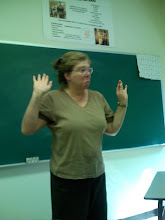Sunday, December 18, 2011
noon ish
Day Twelve, Lanzhou Adventure
Today is remarkably like a Sunday at home: read the NYT this morning, listened to NPR, had fruit and coffee for breakfast. Showered, washed hair, did laundry. Lunch at the student cafeteria (noodles & onion & cabbage; tomatoes cooked with egg; something like green beans – but not – cooked with chicken – I think) for under $2. This afternoon will read student work and refine plan for this week’s classes. At some point I’ll take a break and go to the “supermarket” for a Sprite and a candy bar : ) Maybe I’ll see the security guard who always say “hi.” Now I’m icing knee/foot, and a big difference is that I’m wearing silk long johns and staying under a big comforter to keep warm while doing so.
Yesterday was this week’s big adventure, a day-trip to the Labrang monastery, about 150 miles from Lanzhou. Here a blurb from Wikipedia (may not reproduce the Tibetan characters here):
Labrang Monastery (Tibetan: བླ་བྲང་བཀྲ་ཤིས་འཁྱིལ་ Wylie: bla-brang bkra-shis-'khyil; Chinese: 拉卜楞寺 Pinyin: lābǔlèng sì) is one of the six great monasteries of the Geluk (Yellow Hat) school of Tibetan Buddhism. Its formal name is: Gandan Shaydrup Dargay Tashi Gyaysu Khyilway Ling (dGe ldan bshad sgrub dar rgyas bkra shis gyas su 'khyil ba'i gling), commonly known as Labrang Tashi Khyil, or simply Labrang.[1]
Labrang is located in Xiahe County in Gansu province, in the traditional Tibetan area of Amdo. Labrang Monastery is home to the largest number of monks outside of Tibet Autonomous Region. Xiahe is located about 4 hours from the city of Lanzhou, the capital of Gansu.
The school arranged the trip for all the current Western teachers, so counting the driver, our tour guide Ms. Li and her husband Keith, there were nine of us. Me; Matthias the quiet speech teacher; David the Scot (grizzly red hair and faint brogue, former rugby player); Emily and Zach the Peace Corps volunteers, who’ve been here almost three and one years respectively and seem very young to my aged self; and Linda, who has, with husband-Glen-who-stayed-home-to-grade, been in China about fourteen years and Lanzhou about eight.
I stepped outside just before 7am and met the others a few yards down the alley toward the main street. At 7 Ms. Li called and woke our driver, who had forgotten to set his alarm, so we had about half an hour to get acquainted; I’d met Linda, David, and Matthias before, very briefly, but didn’t know there were any Peace Corps folks here. Zach immediately made my taste buds homesick by mentioning that he’d gotten up early and made bacon & eggs for breakfast. I learned that Emily is from Minnesota and has also been to a December Packers game, and that Matthias is from Massachusetts – no one was freaked out by the cold. Ms. Li reported that it was -17 at Labrang and asked if we would all be warm enough. (Our Chinese hosts are very solicitous of our comfort.)
The driver turned up and we got underway about 7:30, and we got through the city with very little traffic interference, stopping at a restaurant on the western edge for Lanzhou’s claim to fame, the beef noodles, for breakfast. Now that I’ve had said noodles, apparently, I can say that I’ve truly lived.
They come in a medium-size bowl with half-red and half-greeen liquid (I think the red is added spiciness) covering the noodles, which you dredge up, along with bits of onion (and other stuff). The beef comes on a separate platter, and you add pieces of it to your noodles, let it get soaked a bit, and chow down. I think I was the only newbie to this experience. (And they WERE quite good.)
Out of the city, we drove in between rows of low, barren, reddish-brown hills, sharp-edged, with low scrub brush here and there. For the first half-hour, the haze of Lanzhou pollution followed us, and details of the distant landscape were indistinct. As the road steadily and slowly climbed, the haze disappeared and it got colder. There was a skiff of dry snow on the ground. The van’s heating system kept us pretty comfortable, but fog and then ice formed on the inside of the windows. The hills fell away, and there were small fields on either side of the road, every speck of land cultivated, shocks of corn bundled together.
To get to XiaHe, the town near the monastery, you have to pass through a Muslim-populated area, and we saw tiny villages with the tower of a mosque in the center. And I do mean tiny: a cluster of red-brown walls, carved gateways. We began to see groups of cattle or sheep in the fields. Some trees, but not many; not enough water here to support much vegetation, I think. (And the forests got chopped down a long time ago.)
As we approached XiaHe, the hills’ big brothers reappeared on either side, knife-edge mountains in intricate curves. We began to see Tibetan pedestrians, moving toward Labrang, in groups of two or three. They would walk a few paces, put their hands together in prayer, and prostrate themselves, full-length, by the roadside. Get up and do it again. Pilgrims come from their hometowns, praying all the way, to the monastery. Loose pants and long wraps, headbands, black hair and darkish complexions.
We passed through the town of XiaHe, elevation about 13,000 feet, most of which seems to be on that one main street: a couple of hotels, police station, tire shop, and lots of street stalls set up in front of the shops: fruit, shoes, coats, sides of beef, veggies, jewelry, belts. Would love to come back here in the fall (the tourist season).
A right turn off the highway, and we see the monastery complex ahead: white buildings with curving, upturned roofs touched with gold, backed by steep mountainsides. After we get our tickets, we are met in a central open area by our tour guide, a student monk. As a student, he is not allowed to wear anything covering his arms. He has warm-looking boots, and his draped maroon robes may have several layers, but his right arm is bare, and he is hatless/scarfless/gloveless, while we’re all wearing coats plus an assortment of accessories. The senior monks we saw wear a heavy maroon cloak which looks something like an academic robe – and looks a lot warmer than the basic robes.
The monastery has (he says) over 1200 monks, most of whom study in one of six colleges; he is in the college of philosophy, and they spend much of their time in debate. (Rhetoric lives!) There is also a college of medicine, devoting a lot of time to herbal remedies, and an upper and lower Tantric, or Vajrayana, college. The monks rise at 6 to begin their days of study and prayer.
Our group was the only tourists on site that day; this cold and dry season is not a very tourist-y time, but there were a dozen or so worshippers. We visited four different temples, each fairly small, each smelling of yak butter, and each holding, on the front wall, a giant (about 25 feet tall) golden Buddha, in different poses. And each with elaborate fingernail polish. On the walls to either side are rows of smaller (14-inch high) Buddha figures, and from the ceiling and beams hang brightly-colored scarves and panels of cloth. (No photos inside, sorry. Also, the souvenir shop was closed.) The largest indoor space was the “plaza,” a dim, cloth-draped interior with row after row of kneeling mats and little artwork.
There was a sort of museum space where we could take pictures; I took some of large masks which are carried in festival processions and of scenes (a bit like Russian icons) made by local artisans and given to the monks.
We took photos – including some with a tiny donkey – and piled back in the van at about 1:30, I guess, for the drive back. We had a late lunch at a Muslim restaurant (the cuisine is slightly different, and they follow halal – like kosher – in the kitchens), which meant sitting at a round table with a big lazy susan in the middle while servers brought out dish after dish after dish for us to pass around and sample. Rice noodles, bao zi, mushrooms, corn, lamb, beef, radishes, potatoes, and then soup. YUM.
We got lucky on traffic again and were back to campus by about 6pm. The city has made some efforts to tame the traffic beast, restricting driving to city center by odd/even license plates for both private cars and taxis, but those restrictions don’t apply to weekends, and Saturdays can be insane.




